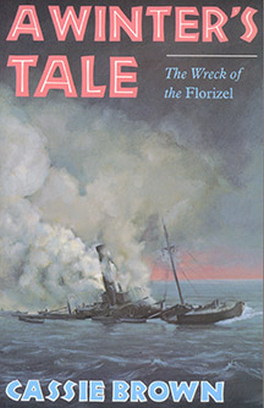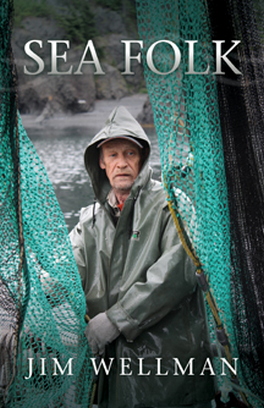In the nineteenth century, the Newfoundland government, under constant pressure from fish merchants, began installing lighthouses in some of the more treacherous places around the island. In the 1950s, Cabot Island boasted a large lighthouse, with a steady, brilliant light and a bellowing foghorn to warn seafarers away from its inviting shoreline. This sentinel of the sea was manned by brothers Alex and Bertram Gill, who hailed from Newtown, a nearby community in Bonavista Bay. In November of 1954, a terrible storm darkened the skies above Cabot Island and battered its solitary lighthouse with a single-minded fury. The keepers of the Cabot Island light were no strangers to sea weather, but when tragedy struck the brothers Gill, the younger of the two was left to fend for himself amid one of the worst storms in Newfoundland’s history. This is a true story of the love between two brothers, a love that perseveres in the face of death, loss, and greatest personal challenge.
Cabot Island
by Gary Collins
At dusk, Bert climbed the seventy-four-foot-high cast-iron tower and placed the lamp inside its glass prism again. The silence of the dark tower was as pressing as the night that closed around the isolated island.
The day for Bert had not been easy. When the Norma & Gladys had slipped past the island and disappeared toward the blue land, Bert had for a time resigned himself to complete and total abandonment. He hadn’t eaten since yesterday. The scoff that he and Alex had prepared for last night’s supper was still warm on the hob of the stove. All through the day he had kept himself busy, climbing the steps to the tower several times, polishing the thick lens until it shone as never before. He had walked the short distance to the “horn house” twice, checking and rechecking the motors that would run the compressor to sound the bellowing foghorn if needed.
Always he returned to his kitchen and closed the door softly behind him, walking quieter still past the open door leading to the room where Alex lay. With another night to face, Bert walked the floor several times, a slow, pointless pacing. Taking frequent glances out the windows, he frowned again at the increasing roll of the ocean. The seas had been building steadily all day, and though the winds were still only moderate easterlies, he knew something was brewing farther out to sea. At one point the full aroma of the still untouched vegetables in the pot suddenly filled his senses. He realized he was hungry.
Reaching across the table to cut up a piece of salt beef, his memory flooded with the many meals that he and Alex had eaten here. This meal in particular was one of Alex’s favourites. Soon he left the table and started to wash the dishes in the stone sink. Swishing the hot water around to hasten the soap bubbles, he suddenly stopped and stared at the suds dripping from the large dinner plate in his hand. Alex needed a shave! His brother was always a clean-shaven man, and no matter how trying the episode would be, he would see that Alex was shaved clean one last time.
Entering the silent room where Alex lay, Bert took the lamp from its gimbal on the wall. From his kitchen he brought hot water in a wash-pan, shaving soap, a brush, and his own razor. Kneeling before the couch and placing the wash-pan on the floor, he looked directly at his brother’s face, noticing for the first time that his black beard was shot through with grey flecks. He felt a strange calm and realized that it was only his time away from this room that invited uneasy and sometimes terrifying thoughts of death and being alone. Here, facing his brother, he was at ease and determined to make Alex look as good as possible. In his mind he heard Alex say, “That’ll take some doin’, then, Bert, ol’ man, to make this face look good.” He smiled.
He tested the water and wondered if it was too hot, or if it needed to be hot at all to shave a dead man. Would Alex bleed if Bert nicked his skin? Bert didn’t know. Applying the water and thick white cream from the shaving mug was easy. When he started to shave Alex, though, he soon discovered that the used blade in his own razor wasn’t sharp enough to do the job. Returning to his own section, he replaced the blunt blade with a new one, the thin blue steel shining as he handled it. He walked once again to his brother. Bert grinned at the still form, the face looking clownlike with its covering of cream streaked with razor tracks. He shaved Alex’s face in earnest, the rasping path of the blade now a satisfying sound.
Above the two men the clock ticked away the evening. Without warning, it stopped. Bert looked up with a jolt. It was as if the room had changed, so stark was the quiet. Halting the shave, he rose from his kneeling position and strode quickly to the far wall. He reached up and rewound the big clock, and the comforting tick-tick resumed. “The time on this earth won’t stop for you, Alex, b’y,” Bert said. “Not while you’re here on this island with me, anyway.”
He towelled the lather from Alex’s face and inspected his work. Satisfied that he could do no more, he stood. “Well, Alex, you’re as presentable as I kin make ’ee now. You’d have done the same for me. That’s one t’ing I know.” And with that, Bert turned down the lamp and left the room, leaving the door ajar behind him.
He filled his pipe as he walked outside to inspect the night, stopping before the door to cup his hands around the pipe’s bowl, until the sulphur match flared against the dry tobacco. The sky was black and moonless, the wind fresh and light from the east, but backing from the north. Not a good sign, he thought. A northeast blow would prevent any leaving or landing on the island for days, maybe weeks. Strangely, Bert wasn’t concerned anymore about spending time alone on the island with his dead brother. His biggest worry was letting everyone know what had happened. He knew that by now the word had reached Newtown. He could almost feel the agony his and Alex’s families were surely going through. He alone knew that Alex was dead, the rest of their loved ones suffering a night of suspense and dreading the answer that tomorrow would bring. The booming sound from Easter Head and the Pound Rocks, and the steady crash of rollers coming from Souther Point, confirmed that he would be stuck here alone for at least a few days. The steady beam of light from the tower showed the slow-moving combers in bold relief against the looming night sea, which seemed to race for the fragile beacon only to die in a snarl of white foam just below it.
Bert stared off to the northwest. He knew that the darker the night, the farther away his tended light could be seen. Ships at sea depended on the chartered light on the Cabot to be there as it had been since 1880. Now, though, Bert’s thoughts were on the distant lights of the peopled land. Far beyond his tiny island, scattered lights dimmed and twinkled behind the dark, rolling seas, winking out and reappearing as before all along the coastline from Newtown to Greenspond. It was church time in all of those towns. Vesper time. Bert silently mouthed the beginning of The Invitatory, the familiar lines of the evening prayer that he had listened to since childhood in the old church on Pinchard’s Island.
“Now as we come to the setting of the sun, and our eyes behold the vesper light . . .” he recited, then moved on to a psalm that always followed the church reading. “You that stand by night in the House of the Lord . . . Lighten our darkness we beseech Thee O Lord, and by Thy great mercy defend us from all perils and dangers of this night . . .” It was fitting, he thought, that his mind would search for comforting words about night and the wonderment of light. He wiped his face and was not surprised when his hand came away wet. In this moment of spiritual catharsis, he was lifted at the sight of the distant Sunday lights and believed that his House of the Lord on this night stood tall and secure behind him, its light pure and a symbol of faith that dispelled the darkest of nights.
Collins focus on an ordinary event taking place under extraordinary circumstances sheds a tender, respectful light on how strength of character can be forged at the anguished intersection of isolation and bereavement.-- Downhome --
The story is intriguing . . .-- The Chronicle Herald --























